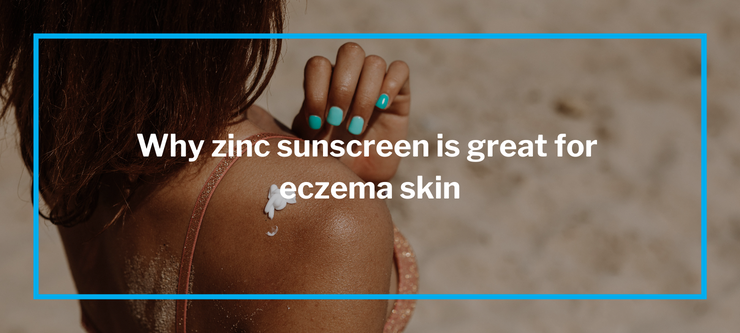Zinc is a great ingredient for those with eczema who want to use sunscreen. It's hard to find a sunscreen that doesn't make your eczema worse, but zinc oxide might be the answer. Zinc oxide blocks UVA and UVB rays, which can cause inflammation. Inflammation can lead to more itching, redness, and peeling on eczema patients' skin—which is why it's so important to wear sunscreen every day, especially on bad eczema days!
For those who have eczema and find it hard to find a sunscreen that doesn't make their skin worse, zinc is your best bet.
Zinc is good for your skin.
Zinc is an ingredient found in many types of lotions, including those with zinc oxide (which is the most effective at providing sun protection) or titanium dioxide (which has a lower SPF). It's also used as an active ingredient in some body washes and shampoos because it helps fight acne-causing bacteria on the skin.
Zinc oxide is a mineral that can be used to treat eczema. It doesn't absorb into the skin, so it's not causing any irritation or inflammation. Zinc oxide has been shown to reduce inflammation, which could explain why it helps with eczema.
In addition to being a good UV filter and moisturizer, zinc oxide may also have anti-inflammatory properties that help improve your condition over time. If you're looking for an alternative treatment option besides prescription medication (which can be very expensive), try using zinc oxide on your face!
Zinc is an anti-inflammatory.
Zinc oxide is an anti-inflammatory, and it's been used to help with eczema. The reason why this works so well is because zinc oxide has several properties that make it effective as an anti-inflammatory. Not only is it a natural ingredient (and therefore safe), but it also absorbs into the skin quickly and creates a protective barrier over the skin that helps prevent your body from getting inflammation.
Zinc blocks UVA and UVB rays.
Zinc, which is found in many sunscreens and body lotions, blocks both types of ultraviolet radiation — UVA and UVB. These two types of ultraviolet radiation are what cause sunburns and skin cancer. While UVB rays cause temporary reddening or tanning of the skin after exposure to them, UVA rays penetrate deeper into the skin and can cause more severe damage over time than UVB rays do.
Zinc helps protect against these harmful effects by absorbing all of it!
Wear sunscreen every day
You should wear sunscreen every day, even on bad eczema days.
It's important to wear sunscreen every day, even when it is cloudy. The sun's rays can still damage your skin by making it more sensitive and inflamed. When the weather is rainy or overcast but still hot out, it’s also recommended that you apply some sort of protection such as a moisturizer or foundation with SPF to help prevent further damage from occurring.
So, if you have eczema and are looking for a sunscreen that won’t make your skin worse, give Zinc Oxide a try! SParms sunscreen is the perfect choice for all skin types, especially those with sensitive skin and eczema.

0 comments